Supporting your digestion and gut health is important for obvious reasons (if you have ever had trouble going #2, you know what we are talking about). But having a healthy gut may also support some surprising functions too, such as supporting our immune health and possibly influencing our mental health.
There are many factors that can impact our digestive and gut health, including our genetics, mode of birth delivery (vaginal birth vs. being born via a c-section), and the use of certain medications. And when it comes to our diet, certain food choices can support our gut health tremendously, while others can hinder this health aspect. Generally, eating a diet rich in ultra-processed foods, a diet low in fruits and vegetables, and including large quantities of alcohol in a diet can negatively impact gut health.
And on the flip side, eating a diet rich in produce, plant-based protein sources (like nuts and beans), unsaturated fats (like avocado and olive oil), and sources of fiber have been linked to positive effects on gut health. Fermented foods can supply the body with probiotics, or beneficial bacteria, which can help keep your gut health goals in check too.
Among the many plant-based, fermented, and fiber-rich foods out there, some options offer unique benefits that are classified as “superfoods” that promote better digestion and a healthier gut.
And these are the six that should find a spot in your gut health-supporting dishes to reap all of the benefits of these impressive food options. Read on to learn what they are, and for more, don’t miss 8 Best Supplements for Gut Health.
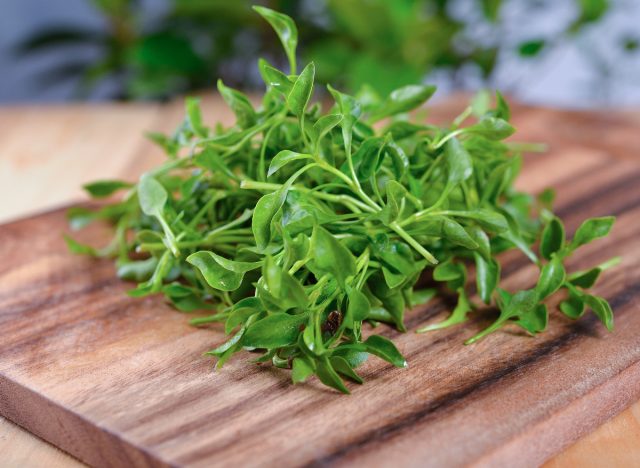

In traditional medicine, watercress is a food for digestion that has been utilized for digestion complaint relief. It is low in calories and is a natural source of fiber, a nutrient that helps support digestive health. Data published in the Journal of Nutrition suggests that consuming watercress and other cruciferous vegetables can help positively alter the gut microbiome, helping the gut have a healthy balance of “good” bacteria that can help support our immune health and potentially help combat chronic low-grade inflammation.
But what makes this vegetable so appealing in the gut-health world is the fact that some data links consumption of cruciferous vegetables, like watercress, with a reduced risk of stomach cancer.
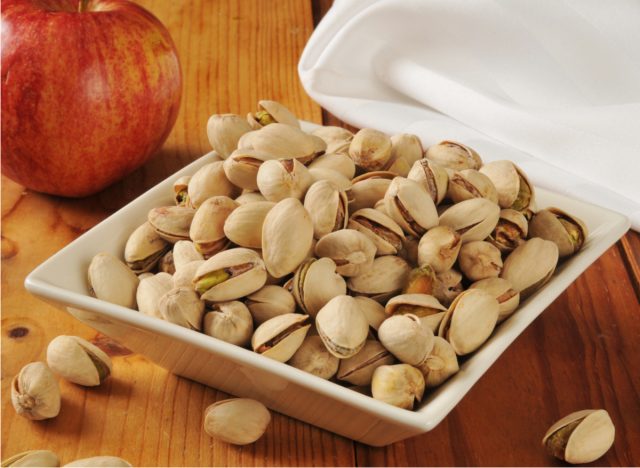

Pistachios are a plant-based source of complete protein that contains 3 grams of fiber per one-ounce serving. Data shows that the combination of fiber and phytochemicals present in pistachios can reach a part of the colon, ultimately helping modulate the microbiota composition. In one study comparing the effects of daily pistachio consumption compared to almond, pistachios showed a higher effect than almonds on the gut microbiota, increasing the number of potentially beneficial bacteria which may support our health.
The combination of gut health-supporting fiber with the healthy fats and plant-based proteins that pistachios provide may help lower blood sugars among those with diabetes, which is certainly a bonus.
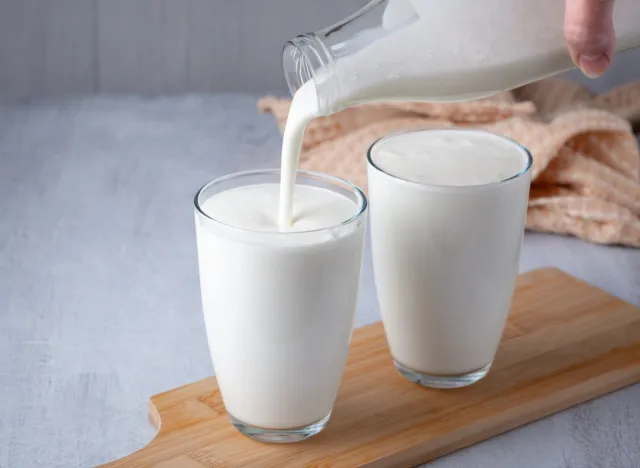

Kefir is a fermented dairy drink that contains lactic acid bacteria, making it a source of ingestible microorganisms that may beneficially regulate gut health and even treat or prevent inflammatory bowel disease. This product may positively impact the gut microbiome balance and promote anti-inflammatory effects – two aspects that can support gut health.
Data has shown an increase in the amount of beneficial bacteria in the gut after regular kefir consumption. So, while a sporadic kefir drink may be enjoyable, to reap the benefits of this fermented drink, making it a part of your daily routine is recommended.
READ RELATED: WHO Declares Eris As ‘Variant of Interest’: 10 Unique Symptoms of New COVID Strain EG.5
Try using kefir in a smoothie—you won’t be sorry!
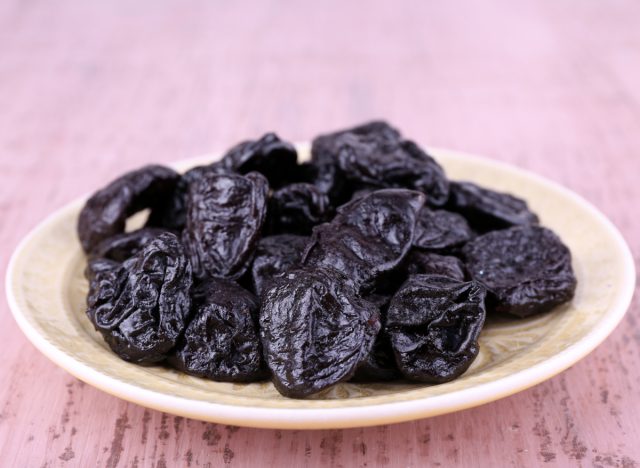

There is a reason why prunes are so popular in the nursing home circuit—they’re a great food for digestion. One serving of prunes provides 3 grams of soluble and insoluble fiber, which can help support digestive health. Prunes have been shown to significantly increase stool weight and frequency. One study, which evaluated forty constipated subjects over 8 weeks, showed that eating 50 grams of prunes every day (around 4-6 prunes) resulted in improved bowel movement consistency and frequency vs. consuming psyllium fiber.
And among postmenopausal women, after 12 months of consistent consumption, data published in Food and Function shows that prune consumption showed enrichment in the bacteria from the Lachnospiraceae family, as well as a reduction in Clostridium sensu stricto 1 bacteria, which is considered to be pathogenic. Lachnospiraceae are a group of bacteria known to produce short-chain fatty acids and are associated with helping to maintain the integrity of the gut barrier along with an ability to lower inflammatory markers in the body.
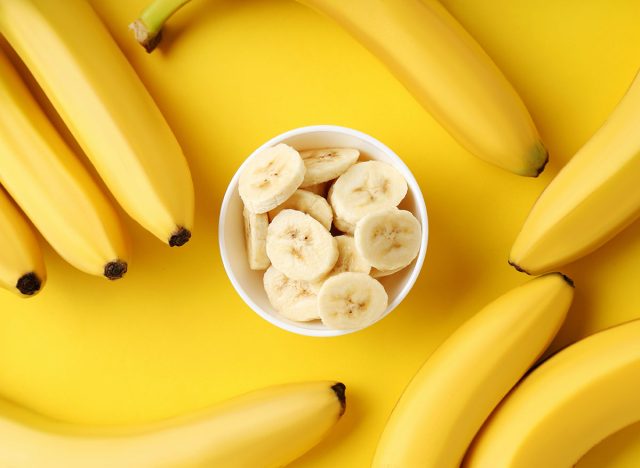

Like many fruits, bananas are a source of fiber, which is a superfood nutrient that can help support digestion and healthy gut microbiota through regular bowel movements. And if you are a fan of a slightly underripe banana (aka those that have a slightly green peel), know that you are getting a boost of prebiotic fiber when you nosh on this fruit choice. Prebiotics act as “fuel” for the probiotic bacteria, helping support your microbiota health in an important way.
One study evaluated thirty-four healthy women, with half of the subjects being instructed to consume twice a day a pre-meal snack, either one medium banana, or one cup of banana-flavoured drink or one cup of water. Results showed that those who ate the banana had increased “good” bacteria in their gut as well as lower bloating levels.
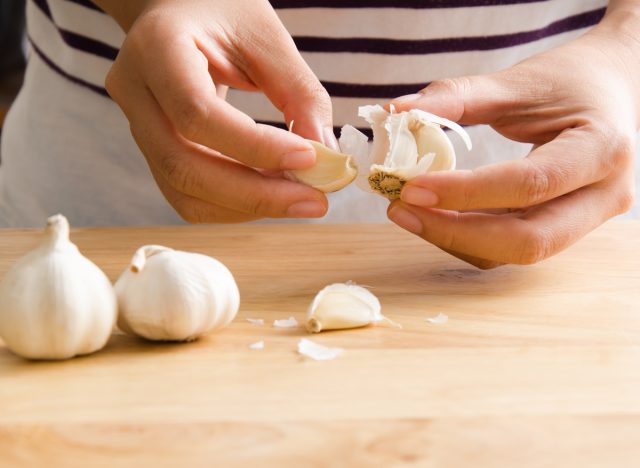

Garlic can do so much more than give your dishes a boost of flavor, it’s also a food for digestion. Along with providing a powerful taste, garlic provides prebiotic components, antibacterial compounds, and sulfur compounds which can help support our health in unique ways. The prebiotic effect has specifically been shown to support the growth of a strain of the acidophilus probiotic bacteria, which has been shown to benefit those with diarrhea.
In one study evaluating a small sample of women over 2 months, results showed that garlic consumption was linked to positive changes in the gut microbiota, specifically among subjects with obesity.
Garlic is also a fantastic addition to dishes if you are focused on reducing your sodium intake, as this ingredient can make your recipes have a satisfying taste without loading up on extra salt.
Lauren Manaker MS, RDN, LD, CLEC








